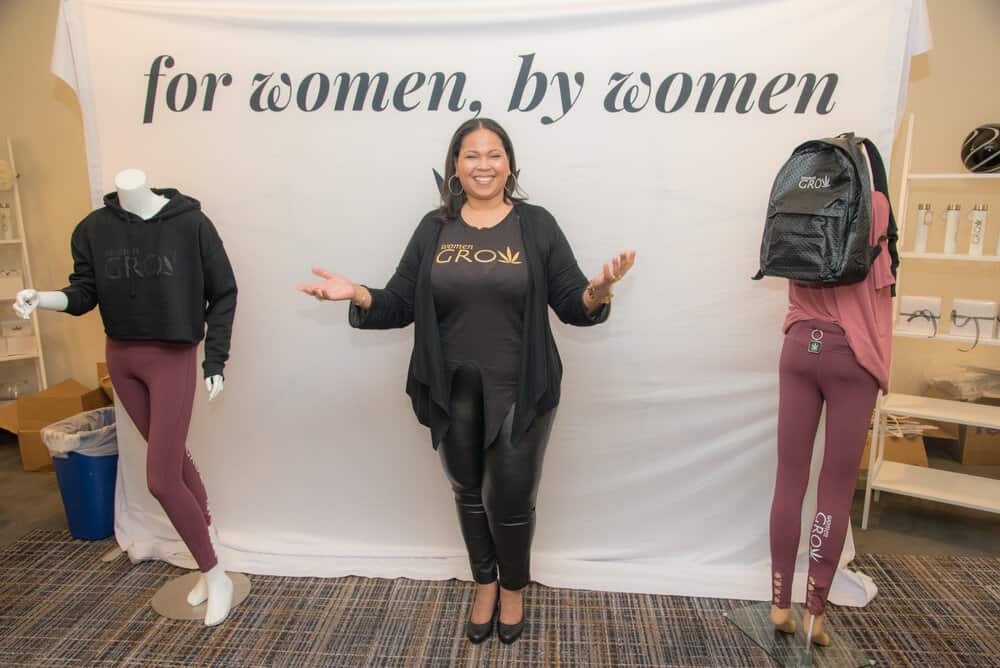When Gia Morón came to Women Grow (WG) in 2015, she counted only five people of color in the room. Today, WG is recognized as the preeminent national networking organization for women in cannabis, and Morón, an award-winning communications executive, has graduated from being its New York City market leader to its President. Along with WG’s Chair and CEO Dr. Chanda Macias, Morón has changed the professional landscape for women of color. Cannabis “was the beginning of an awakening for all women to see what opportunities there were for them,” she says. Still, much greater work lies ahead.
GIA MORÓN: I love the people I’m meeting and unlike any of the past generations of my family, I get to be part of the development of a brand new industry. Sadly, women haven’t had a voice in the development of any of the industries that we see operating today, which is why this work is so exciting. Here [Chanda and I] are, two women of color, leading a company [where] we are here for all women. The hope [is that] at some point we don’t have to talk about the inclusion of women and WOC… [that instead] we are naturally, consistently operating in an inclusive, diverse industry. That we still have to push for inclusion tells me we have more work to do. I want to see all women lead and win at whatever level they consider success.
Women Grow itself has become more diverse, and kudos to all who have worked to make that happen… I believe we have to have more women of color in this industry.
We no longer want to hear how cannabis companies claim to need more women and then do nothing. We want to see women and WOC at every level; in the C-suite, on boards, in managerial and entrepreneurial roles. If you see all men [on your team], then you need to diversify. If these men are having a hard time finding talented women, let us be that helpful resource! WG [functions] as the gateway to connect phenomenal people in and out of this industry.

You’ve actively partnered with faith-based communities for educational events, especially Emmanuel Baptist Church, Brooklyn’s largest Black parish. What’s resulted from this outreach?
This industry faces resistance from faith-based communities because we, as a society, have been taught cannabis is [a] Schedule I drug and is bad for you. Leaders of faith and various organizations have passed on that message [even] as legalization is happening… In the black community, the church is the core of that same message. [However], black churches have seen how much it’s impacted their congregations, because men and women of color have gone to jail for it. As legalization spreads, we see more people from other cultures and backgrounds getting involved, but [some] black and brown folks still resist. The reason for that, partly, is because black church leaders refuse to change the message.
[WG has] never told a reverend or pastor to consider the positive side of the cannabis industry. Instead, we explain what we’re doing and the differences being made… Many of us who come from impacted communities want to open the door and suggest, “Hey, maybe you’ll be interested in what you’re hearing and want to join us.”
Our overall goal is to connect with women and POC who aren’t receiving the information. Our market leader in Philadelphia, Laurel Freedman, is Jewish. She had a “Faith in Cannabis” event at her local temple [with] multiple religious leaders… The idea is to share knowledge and [create] a safe space, providing information and answers.

In addition to barriers in the legal industry, many POC have been victimized by laws surrounding illegal cannabis. Do you believe they are owed reparations?
Industries have been built on the backs of black people, and there are yet to be any type of reparations. There might never be… The government owes blacks a fair entry point [to cannabis] and equity… It’s unfair not to have a social equity component to this industry and to avoid addressing the social injustice. A pathway needs to be created so that black people who began this journey behind the starting line are now given a way in. If black and brown people aren’t part of this growth, that’s crazy. It’s wrong and it must change.

What does the future hold for Women Grow?
My hope is to create bigger, better opportunities for women [through] partnerships both inside and outside this industry, [and] mainstream conversations that don’t just focus on gender or color. WG has rebranded the way we share information [with our] Signature Education Webinar (SEW), [where we] plant a seed of education towards growth.
One area we didn’t address properly was disabilities. After an event, a woman in a wheelchair came up to me and pointed out… how we can be inclusive of this class of people, the right terminology to use, and how we can make it easier to participate in the cannabis industry. Women with disabilities in cannabis matter. We always want to be held accountable so we can make learning accessible to all communities.


